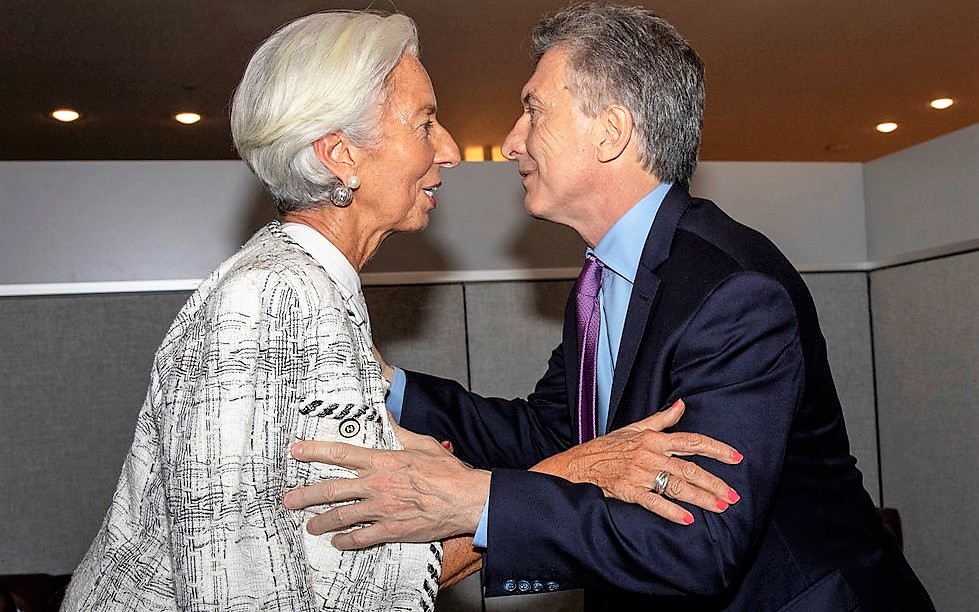To receive a free full-text email of The Zeitgeist whenever we publish to the website, please sign up here. You’ll get two or three of these emails every week, and your email will not be shared with anyone. Ever.

Yes, Deadwood is the greatest HBO series ever. Don’t @ me. I’m not having it. David Milch is MY President.
And while Al Swearengen is the greatest character of that greatest show, the fact is that it’s another character – George Hearst – who drives the Narrative arc for the entire series (and movie). Distant oligarch George wants the gold. He wants the timber. He wants the land. He goes to great lengths and great expense over a period of several years to acquire those assets, and then, by God, he is prepared to go to even greater lengths and greater expense to keep those assets. Because once acquired, by hook or by crook, those assets are HIS.
You see, Deadwood is a show about property rights.
So is the Argentina – IMF show.
IMF not saying when Argentina could get last disbursement [Associated Press]
The International Monetary Fund refused to say Thursday when it will disburse the last $5.4 billion of a massive loan to Argentina that was originally planned for mid-September.
IMF spokesperson Gerry Rice said at a news conference that he didn’t “have specific information on timing.”
Reporters had asked him whether the organization will wait for the winner of the October presidential elections to take office on December 10 before releasing the funds.
Over the years, I’ve written a lot about Emerging Markets (EM) and the narrative here in the US and other developed markets about EM Investing ™. Here’s the note from six years ago that started this thread, “It Was Barzini All Along“.
Six years later, and I wouldn’t change a word. What is the core narrative for thinking of emerging markets as an asset class? What is the line you hear over and over and over again?
“EM is where the growth is.”
Or in the Epsilon Theory lingo, “Yay, EM growth!“
Except it’s not working. Or at least it’s not the emerging market-ness of a country that has driven its economic growth (or lack thereof) over the past decade, but rather that country’s sensitivity and vulnerability to DM monetary policy in general and US monetary policy in particular.
Is there a meaningful secular growth reality in emerging markets? Of course there is. But that and $2.75 will get you a subway token. It’s not that the secular growth story in emerging markets is a lie or doesn’t exist. It’s that it hasn’t mattered. In the same way that value and quality and smarts and careful fundamental analysis haven’t mattered. For a decade now. You know … Three-Body Problem and all that.
But the growth narrative for EM as an asset class is just the public core narrative for EM Investing ™. There’s a non-public core narrative, too. A much more foundational narrative.
“Your property rights as a foreign investor will be preserved.”
Or in the Epsilon Theory lingo, “Yay, EM property rights!“

This is why the IMF exists. This is what the IMF does. This is what the IMF means.
To protect the property rights of foreign investors in emerging markets.
Now don’t get me wrong. I believe that the property rights of foreign investors SHOULD be protected. I believe that everyone – but most of all the citizens of emerging markets – benefit from the free flow of global capital, and global capital ain’t gonna flow freely to you if there’s a risk it gets stolen.
But I also believe that the local returns on global capital access are almost always hijacked by the local oligarchs, and even if they’re not hijacked completely, it is entirely appropriate for local governments to negotiate and renegotiate those returns on capital. I also believe that there’s nothing sacred about foreign investor property rights, as those rights are not at all the same as the rights of citizens. I also believe that a nation should be free to burn itself on the hot stove of nationalizing assets or defaulting on debt or otherwise choosing an antagonistic stance towards global capital.
And to be sure, it’s not like the IMF rides into town like George Hearst rides into Deadwood, surrounded by Pinkertons and committed to preserving his “rights” through the barrel of a gun.
But it’s not that different, either.
I know, I know … here I go getting all political again.
Look, you don’t have to agree with me about whether the subordination of foreign investor property rights is a good thing or a bad thing to agree with me that this subordination IS … that foreign investor property rights are, in fact, under a withering political assault in Argentina today, and that this isn’t just an idiosyncratic Argentina thing.
Why am I so down on investing in emerging markets AS AN ASSET CLASS?
Because I think you need two functioning narratives for EM Investing ™ to work.
- Yay, EM growth!
- Yay, EM property rights!
Today those narratives are broken. And until they’re somehow patched together again, I don’t think it’s possible to have the systemic narrative support required for institutional capital flows into emerging markets as an asset class.
It’s not just the Argentina narrative that’s broken. It’s not just the IMF narrative that’s broken.
It’s the entire EM Zeitgeist that’s broken.
What’s a Zeitgeist? It’s the water in which we swim.
Can idiosyncratic investments in emerging market opportunities work while the EM Zeitgeist is broken? Sure!


That Lagarde-Macri pic is so creepy
What does NLP say about the narrative shift? What is really happening with institutional capital flows into or out of EM equity? I don’t have the data, but my guess is that institutional flows have been positive and growing in this space for some time. Even if it remains a tiny institutional space, inflows are inflows right?